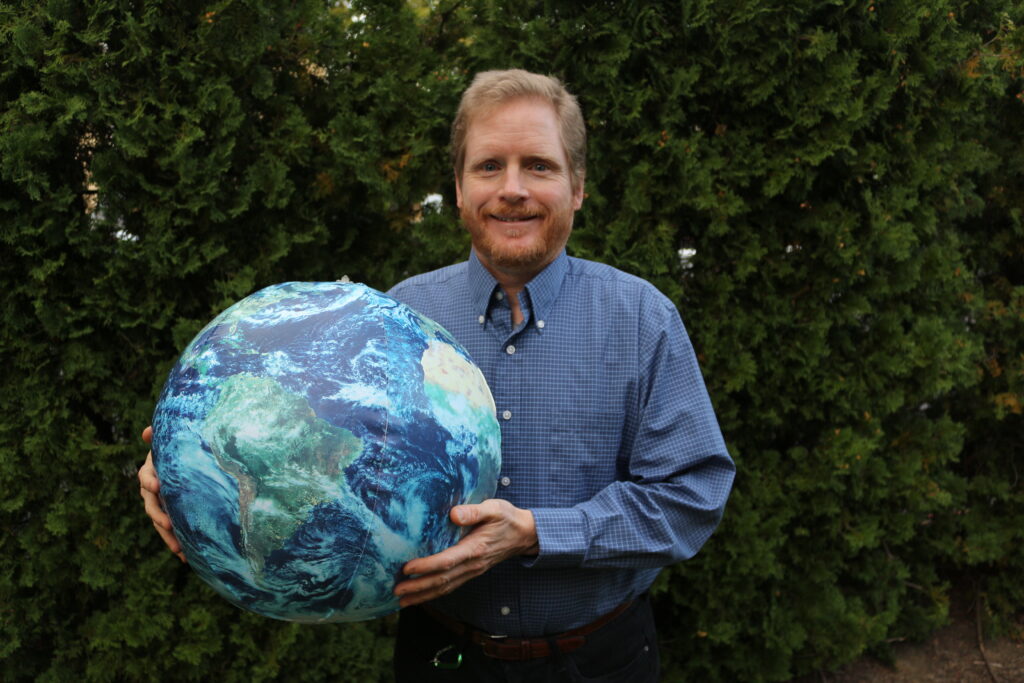
‘Do you know who your member of Congress is? Wait! Better yet: Do they know who you are?’
– Educator, Climate Reality Leader and Citizens’ Climate Lobby organizer Greg Hamra
I first heard Greg’s advice on a YouTube video, PEOPLE’S CLIMATE MARCH, that was created by Producer and Director G.J. (Gerald) Clarke with his production company, The Ledge Media. I met GJ Clarke at a Climate Reality Project Training in 2017 and discovered this 12-minute video around that time. This video was a short documentary of the 2017 People’s Climate March in Washington, D.C.
This march took place on April 29, 2017, marking the 100th day of Donald Trump’s Presidency. It was a huge protest by climate organizers across the United States to speak out against Donald Trump and his administration’s rollback of climate and environmental policies. It was estimated that over 200,000 people participated in the D.C. march, as well as a million locations throughout the U.S. and other parts of the world. My wife and I attended a People’s Climate March in Medford, Oregon on that same day.
Somehow, I had discovered Gerald’s video through Climate Reality Project soon after he had released this documentary on YouTube on May 29, 2017. The video was enjoyable for me to watch to see how many friends I could recognize since this short documentary centers around Climate Reality’s involvement with this march. In the video, I spotted friends Laura Betts, Olena Alec, Tim Ryder, Joshua May, Harriet Shugarman, as well as Greg Hamra. Even more, it was great to see former Vice President Al Gore shaking hands with some of the march attendees and participating in the March. I met and chatted with Al Gore at the 2015 Climate Reality Training in Cedar Rapids, Iowa. I found him to be very kind, friendly, and engaging. He thanked me for my climate organizing. I blogged about it afterwards.
A humorous moment in the PEOPLE’S CLIMATE MARCH video comes when Greg Hamra is wearing his purple octopus costume. Greg’s costume represents when an octopus washed up in a Miami, Florida parking garage in November 2016 during one of the highest “king tides” during the year. A high tide no doubt made worse by sea level rise caused by climate change. Greg’s flamboyant costume caught the attention of billionaire Richard Branson who was attending the march with Al Gore. The video shows Richard Branson getting his picture while shaking hands with Greg wearing his octopus costume. Greg steals the show in this video. Not only with his costume, but also with what he has to say.
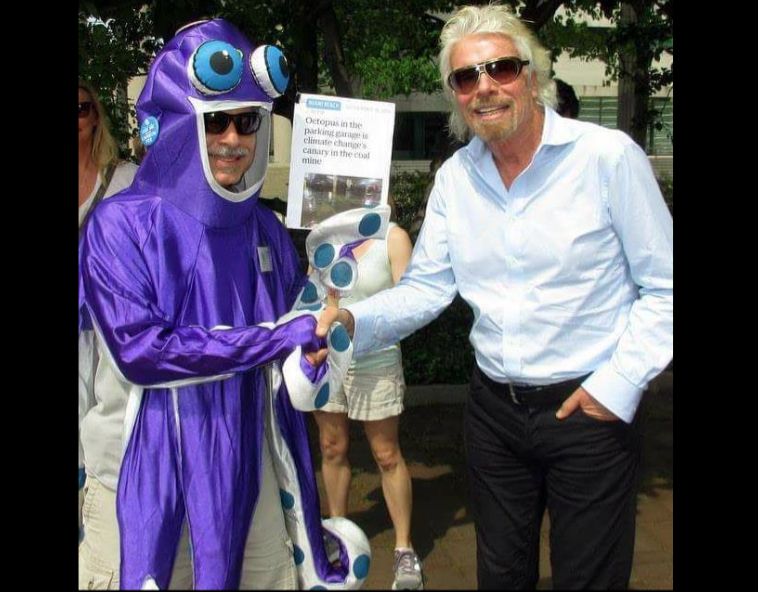
I have known Greg for years, primarily through Citizens’ Climate Lobby (CCL). I met him in person when we were attending the CCL Conference in Washington, D.C. in November 2015. We total agree on the actions needed to solve the climate crisis. Thus, I fully applaud what he says on this video.
Greg stated: “Citizens’ Climate Lobby is a 60,000 plus volunteer organization and we are the only NGO (nongovernmental organization) that’s solely dedicated to educating members of Congress about economically viable solutions to climate change. A lot of people are emersed in personal lifestyle greening. We’ve been doing that for 40 years. We are losing the war…
What we need is political will for a livable world. It’s not enough to change your lightbulbs. We must change our leaders and our laws…
Poking holes in the planet, to set on fire what comes out to power our industry, buildings, and vehicles. We have to reduce our emissions. So, there is no amount of personal lifestyle greening that you are going to do that’s going to stop that. There’s one thing that will and that’s putting a price on carbon. A tax or a fee and returning the money to citizens. That’s one way to do it. A carbon fee and dividend. Some people say that you shouldn’t call it a tax if the government is not allowed to keep it. And if you return it back to citizens and money goes back into the economy, that’s good for everyone.
Protesting, shouting, complaining, marching. Is it effective? Maybe. Maybe not. When it’s The People’s Climate March and there’s 400,000 people and it’s all over the media, I think there’s an impact to that. That’s one day a year ago and (today) and last week, the Science March. But, if we don’t take that and get active and all we are doing is just spending our time making ourselves feel good (he demonstrated patting himself on the back) by changing our lightbulbs, taking a shorter shower, and taking our bikes to work, and getting loud once in a while, and carrying a placard in the street, and you don’t know your representative. Wait! And, they don’t know your name, you’re not doing a good job.”
To make his point even more clearly to the audience at home, Greg stopped looking at the interviewer and looked directly into the camera to say: And you don’t know your representative. Wait! And, they don’t know your name, you’re not doing a good job.”
That final sentence in Greg’s long statement for the camera is the best advice I have ever heard for climate action. This is something for all of this to ponder: Do you know who your U.S. Senators and your member of the U.S. House of Representatives is? Do you know who your state legislators are? Greg’s words have been bouncing in my head ever since I saw this 2017 video.
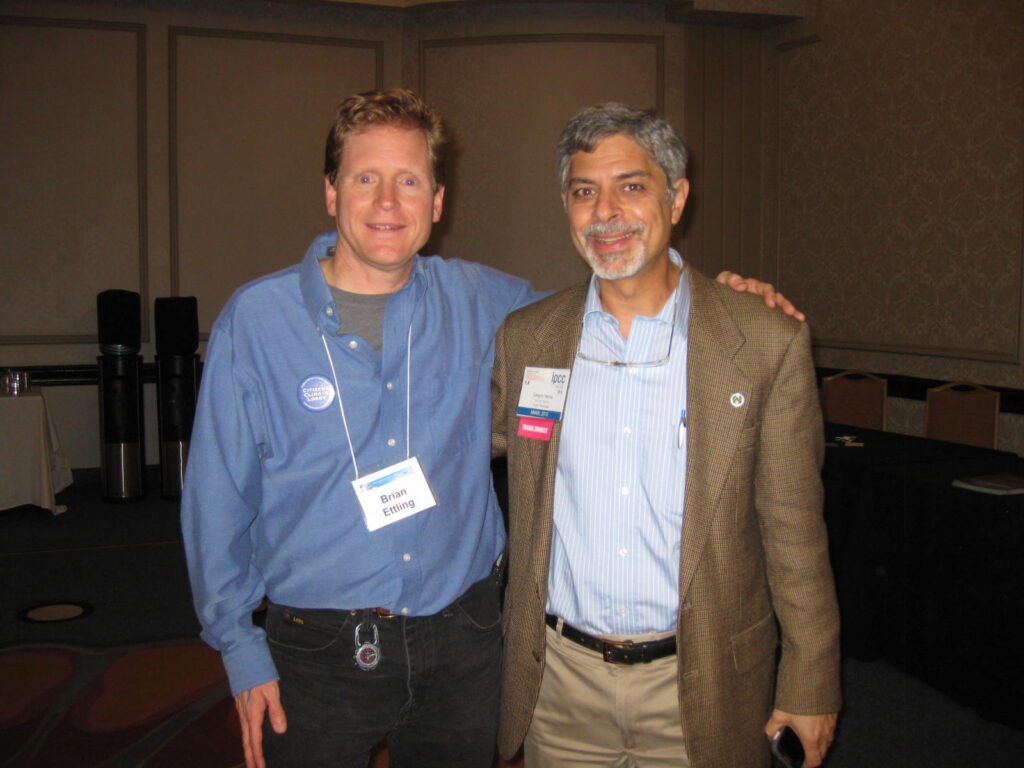
The Importance for Climate Action of knowing the name of your Member of Congress
Greg had reinforced something I read in 2013 edition of Sam Daley-Harris’ book, Reclaiming Our Democracy: Healing the break between people and government. Sam Daley-Harris is the founder of RESULTS, an anti-poverty and anti-hunger NGO that regularly lobbies Congress since 1980 to fund tens of billions of government funding for the fight against poverty and hunger. In the first chapter, Sam writes about speaking hundreds at high schools in 1978 about world hunger. He was talking about building “political will” to end hunger. He wrote:
“I didn’t have any sense of what “political will” was, but I knew it might start with a basic awareness of who represented us in government. So, at the beginning of the first class, I asked 25 students a simple question. The responses changed my life.
The question was: ‘Who knows the name of your member of Congress?’ I added: ‘I don’t want to know if you’ve written them or met them, just their names.’
Five hands went up.
‘Only five hands?’ I thought.
But it got worse. I called on the first student. He named the governor.
‘No’ I said, ‘I’m looking for the name of the person who serves you in the U.S. House of Representatives.’
He didn’t know. Four out of 25 did. In the next classroom none of the 28 students knew. I was hooked. Over the next two years, 1978 and 1979, I asked 7,000 high school students to name their member of Congress¬––200 knew the answer, 6,800 didn’t. Later, when RESULTS started and things got difficult, this experience served as part of my foundation, part of my grounding. It gave me a direct sense of what needed to be done. We had to find a way to generate the political will–¬–we had to teach the skills of democracy and acquaint people with their government, starting at the most basic level. The seed had been planted.”
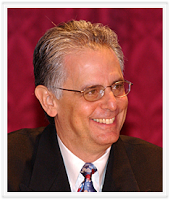
RESULTS volunteer Marshall Saunders asked Sam Daley-Harris to advise him when Marshall founded Citizens’ Climate Lobby (CCL) in 2007. Marshall wanted to try to duplicate the success of RESULTS had in successfully lobbying Congress to fund billions of dollars in anti-poverty programs. Marshall wanted Sam to mentor him to copy the ongoing lobbying success of RESULTS so CCL could persuade Congress to pass effective climate legislation. Sam was happy to coach Marshall. When I first became involved with CCL in 2012, they often talked about Sam. CCL would sometimes invite Sam come in as a guest speaker on their monthly conference calls and Washington D.C. conferences to share his wisdom.
Thus, CCL inspired me to read Sam’s book Reclaiming Our Democracy soon after I joined them in 2012. CCL trains its volunteers, such as Greg Hamra and me, to develop positive relations with our members of Congress and their staffs to try to urge them to pass CCL’s policies to address climate change, primarily a carbon fee and dividend. With my involvement in CCL, I started meeting with the staff of my members of Congress as far back as August 27, 2013.
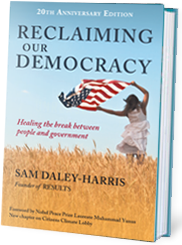
My first attempts at lobbying Congressional Offices for Climate Action
After I became involved in CCL in May 2012 while spending the winter in St. Louis, Missouri, I was determined to launch a chapter in southern Oregon, preferably Ashland, Oregon. While working as a seasonal park ranger at Crater Lake National Park, Oregon, I loved driving down to Ashland on my weekends to do my grocery shopping and see friends. I noticed that it had a very progressive, save-the-earth vibe that would be perfect for an active CCL chapter. I networked during the summer of 2012 with various Ashland folks who were concerned about climate change to see if anyone would be interested in forming a CCL chapter. I did find some interested folks who formed a chapter in January 2013.
At that time, the chapter was led by Susan Bizeau. During the summer of 2013, Susan pushed hard to have meetings with the district staff of Republican Congressman Greg Walden (OR-02) and Democratic U.S. Senator Jeff Merkley of Oregon. I drove an hour and a half from Crater Lake to these district offices in Medford, Oregon to join them in their lobby meeting. I remember it as a fun and empowering experience, even if we could not find much agreement in our meeting with Walden’s Deputy Chief of Staff. Merkley’s staff was pleasant and totally agreed with us that climate change is a huge concern. However, they did not seem to have much to say about the carbon fee and dividend policy.
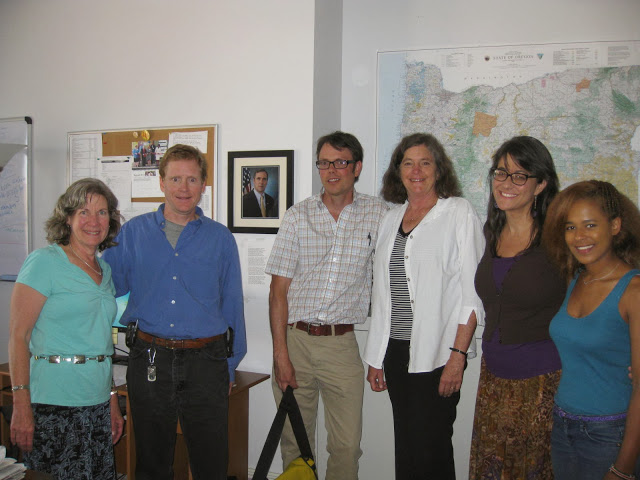
As the expression goes, ‘Rome was not built in a day.’ This lobby meetings showed me that it was going to have to take a lot more relationship building, encouraging more constituents to write letters and contact their members of Congress, and more lobby meetings before either of these offices could begin to shift their positions to support carbon fee and dividend.
Following the positive experience of lobbying in Oregon, I first lobbied the district office of my Missouri Republican member of Congress, Rep. Ann Wagner (MO-02), on February 14, 2014. That meeting was 9 years ago. I don’t have memories of what was said in that meeting, since so much time has passed. However, I remember it being a great experience that we respectfully listened to Rep. Wagner’s staff, and they listened to us. We agreed to meet again in the future to have more discussions. I remembered the staff telling us that they had received a ‘biggest pollutor’ award from the Missouri Sierra Club, which was just handed to the office and then the local Sierra Club just left. Wagner’s office much preferred CCL’s approach to listen and try to find common ground.
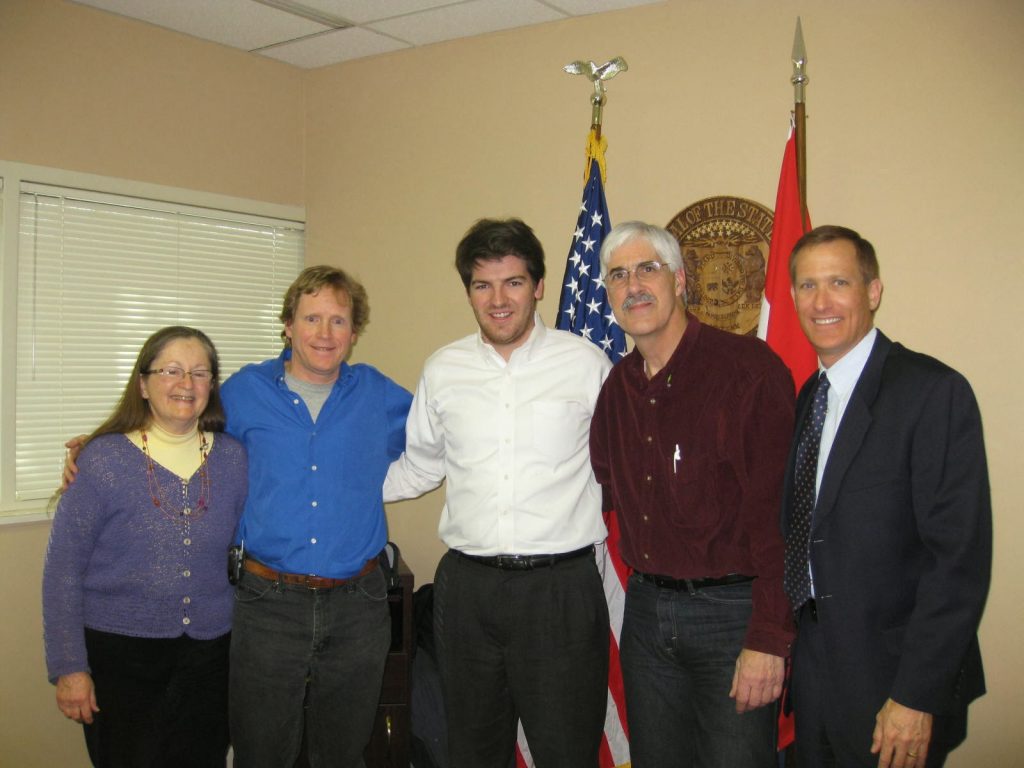
For me, it felt like the most empowering thing I could do for climate action was to have these lobby meetings with the staff of my member of Congress to urge them to pass legislation for climate action. It mystified me then and today why more people who are concerned about climate change do not call, email, write letters, and lobby their members of Congress. Yes, I have enjoyed over the years marching in the streets with thousands of other climate advocates and attending a street protest now and then. However, I always wanted to do something to act on climate on a much deeper level. As much as possible I want to be in The Room Where it Happens as they sang about in the Broadway Musical Hamilton:
No one really knows how the game is played
The art of the trade
How the sausage gets made
We just assume that it happens
But no one else is in the room where it happens
No, I was not planning to run for office. For years, I have been intrigued about being a Congressional or legislative staff person. At the very least, I wanted to be in on the Congressional lobby meetings for climate action to try to sway them to support climate legislation. As I blogged about after my first lobbying trip to Washington D.C. in 2015, there are frequent protests outside of the Congressional Offices Buildings and the U.S. Capitol Building. Enough protests that Congressional staff do not really pay attention. They even know which building exits to leave to avoid them. Thus, to me, it always seemed more effective to be meeting with Congressional staff and even face to face meetings with members of Congress than just protesting.
I do get that many climate advocates think it is a waste of time to lobby because their members of Congress are conservative Republicans who are resistant to passing climate legislation. Or their members of Congress are progressive Democrats who already agree with them that climate legislation must be passed. In both cases, they think, ‘Why bother?’ However, I have my own response to that. After I moved to Portland, Oregon, I created this meme on social media to respond to those excuses:
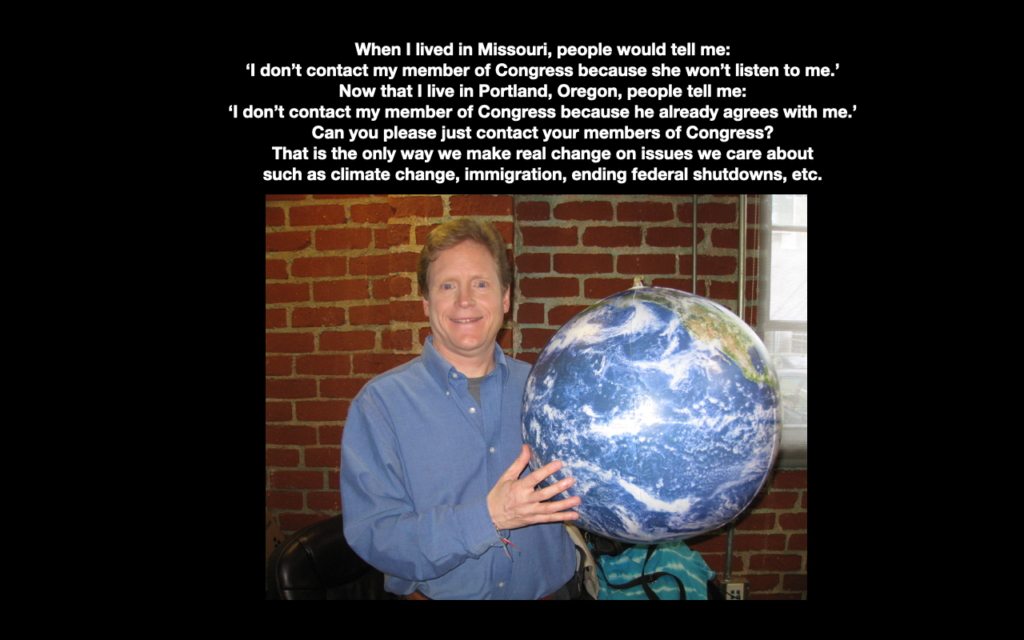
Over the years, I really have enjoyed lobbying Congressional offices with Citizens’ Climate Lobby since 2014 and lobbying state legislators in Oregon since 2018. When I spent my winters in St. Louis, Missouri up until 2017, I would regularly meet with the staff of my Republican member of Congress. The staff would tell me how much they enjoyed meeting with me. They even expressed disappointment when I shared in June 2017 that I had moved to Oregon and would no longer be lobbying their office. They said I was still more than welcome to participate in future lobby meetings with the office. No, I didn’t persuade them to support any climate legislation, but I still learned a lot.
Behind closed doors, they admitted to me that they knew that climate change is real and a threat to our economy and health. They shared that they would be following what happened with the United Nations COP (Conference of Parties) Conferences, COP21 in Paris, France in November 2015, where delegates from nations across the world would be negotiating international agreements for climate action.
Even more, they expressed some interest in the CCL carbon fee and dividend policies that I lobbied their offices to support. However, they would share that they did not get phone calls, emails and letters from constituents urging them to support that policy. Even more, they had concerns about getting in front of their conservative most loyal voters. Thus, they wanted to make sure that we were engaging them and persuading them before they could support such a policy. I thought that was a fair and square demand. They wanted to see there was “political will” before they felt like they could bravely go out on a limb to support our policy.
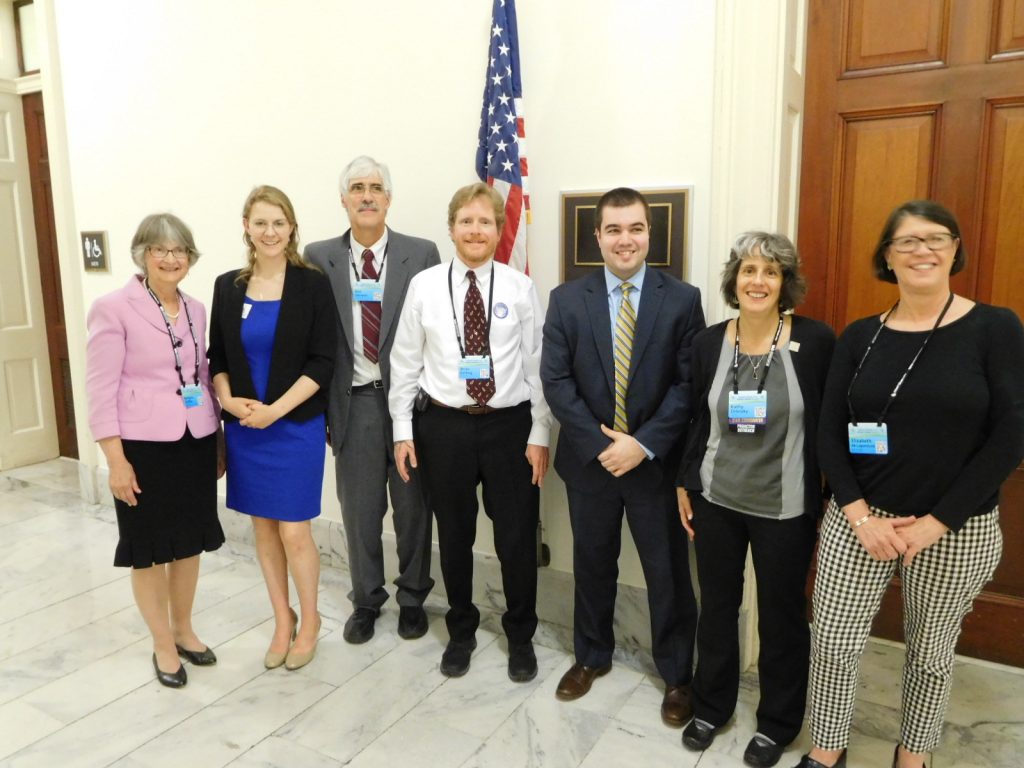
As Sam Daley-Harris discovered in the late 1970s, members of Congress need to see “political will” before they would decide to support a certain piece of legislation or policy. I always felt like I learned so much from lobbying.
In the 2017 People’s Climate March video, my friend Greg Hamra said it so beautifully and succinctly about the importance of lobbying: “(if) you don’t know your representative. Wait! And, they don’t know your name, you’re not doing a good job.”
Thus, there is another part of the formula or secret sauce. It is not enough to regularly lobby your elected officials, you should be lobbying and engaging with them enough that they know your name.
The Congressional Management Foundation’s insights on lobbying members of Congress
In November 2015, I attended a CCL conference in Washington D.C. The guest speaker was Brad Fitch, deputy director of the Congressional Management Foundation (CMF). Their mission is to work directly with Members of Congress and staff to enhance their operations and interactions with constituents. build trust and effectiveness in Congress. CMF also works directly with citizen groups, such as CCL, to educate them on how Congress works, giving constituents a stronger voice in policy outcomes. In addition, Brad Fitch from CMF spoke at the June 2017 CCL Conference in Washington, D.C.
At the 2015 CCL Conference, I remember Brad Fitch shared a compelling story about a conservative Republican member of Congress meeting directly with a constituent who is struggling with a disease. Before he met with that constituent, he had every intention of voting against that bill that would provide funding for medical research to find cures for that disease. However, after he met with that constituent, heard their story, got to know the person, and learned their name, that member of Congress could not bring himself to vote against that bill.
The lesson was that impactful stories directly from a constituent can move members of Congress. It can be the most effective tool to change the mind of a Congressperson. During his presentation, Brad showed a survey poll of Congressional staff asking them, “If your Member/Senator has not already arrived at a firm decision on an issue, how much influence might the following advocacy strategies directed to the Washington office have on his/her decision?”
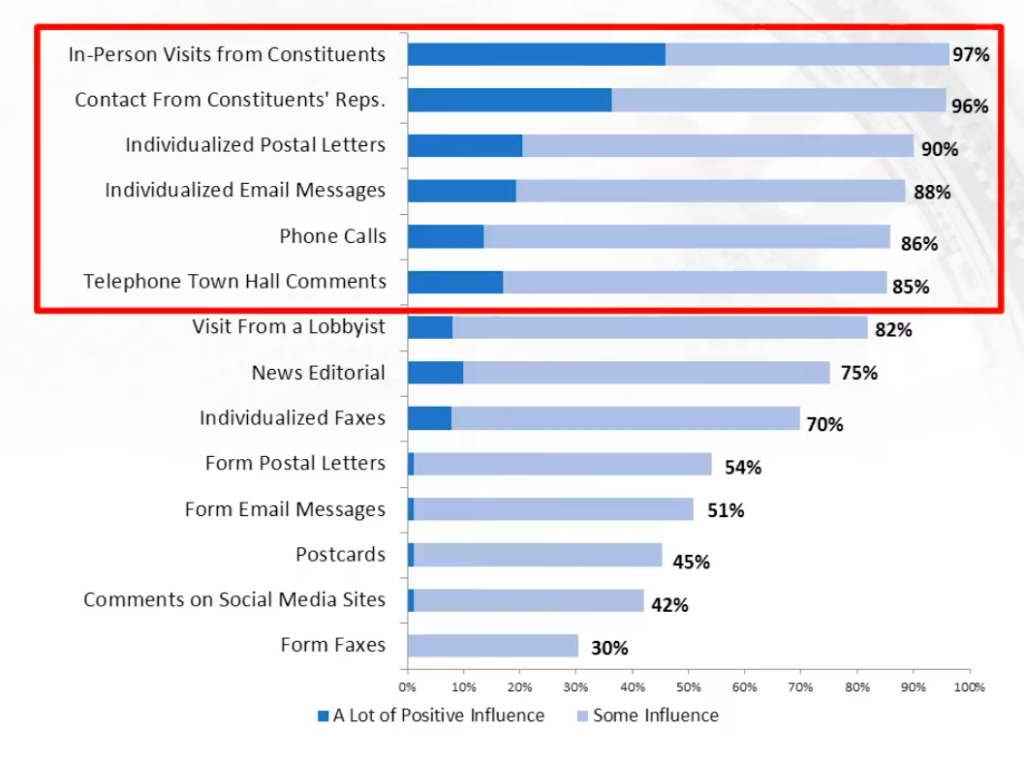
The top answer by far from Congressional staff was that 46% said an in-person visit from a constituent would have “A lot of influence.” This was a huge margin over 8% of Congressional staff saying that a lobby visit would have “A lot of influence.” Thus, Sam Daley-Harris and Brad Fitch held vital messages for me that it is so important to know who our members of Congress are are and to regularly engage them. Greg Hamra’s cemented that point further that they should know us and our names for those key moments when they are deciding to support specific climate legislation bills.
Thus, after Greg Hamra’s statement on the 2017 People’s Climate March video, I made it my mission in life that I was going to show up to lobby my members of Congress and state legislators that they would know my name. Even more, they would know my name when deciding to support which pieces of climate legislation.
My determination that my congressman and state legislators will know my name
Just a few days after the 2017 PEOPLE’S CLIMATE MARCH was released on YouTube, I wrote a letter to my member of Congress, U.S. Rep. Earl Blumenauer (OR-03) in early June 2017. In the letter, I thanked him for his leadership in the U.S. House of Representative for introducing a carbon pricing bill and strongly voting for climate legislation. I then shared my history of working as a seasonal park ranger at Crater Lake National Park for 25 years. I wrote how I saw the impacts of climate change there with the annual average snowpack diminishing and the summer fire season getting more intense. Therefore, I urged him to support the carbon fee and dividend policy to address climate change.
One week later, I attended a CCL conference in Washington D.C. and was part of a group of CCL volunteers that lobbied his office. During the meeting, Blumenauer’s Energy and Environmental Aide told me that Congressman Blumenauer had seen my letter and had appreciated me writing to him. It felt good that Rep. Blumenauer read my letter and wanted to pass along to his staff during the lobby meeting to let me know he had read it.
Since then, I ran into Rep. Blumenauer numerous times at various events and even attended an in-person lobby meeting with him in Portland, Oregon in October 2019. I am not sure if he knows who I am by now. He has never called me by my name or acted like he remembers me from previous encounters. Still, he sees so many people in Washington D.C. and Portland, Oregon that many people and names becomes a blur after a while. Having said that, I am still grateful that I have put myself out there to promote climate solutions when I see him. No, I was not able to persuade him yet to support carbon fee and dividend or specifically the Energy Innovation and Carbon Dividend Act (EICDA). At the same time, no one else has had success to convince him to support carbon fee and dividend or specifically the EICDA. For me, trying but not yet succeeding feels much better than not trying at all.
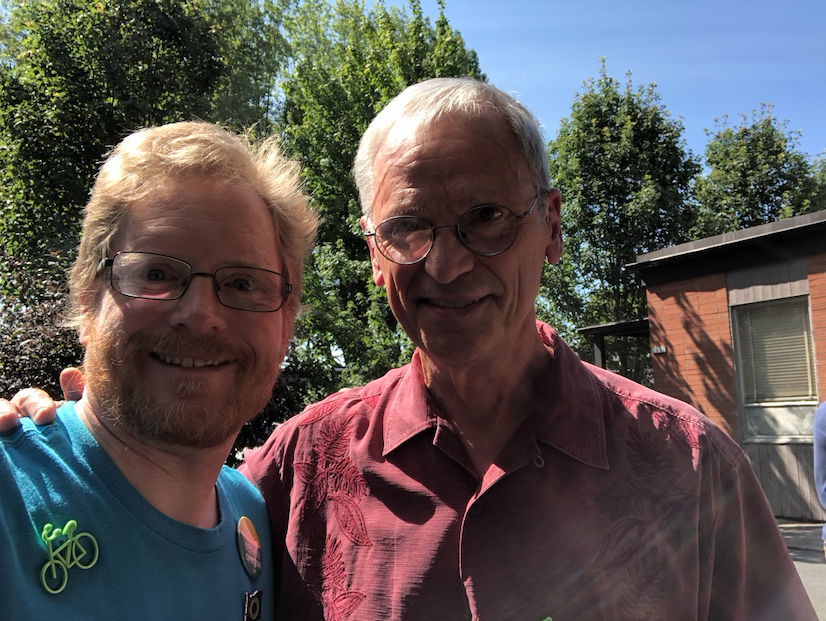
In the summer of 2018, I started volunteering with Renew Oregon with their efforts to work closely with Oregon state legislators to pass a cap and invest bill. For Renew Oregon volunteers like me, much effort would be needed to regularly lobby state legislators to urge them to make passage of the cap and invest bill a high priority. That summer fellow CCL and Renew Oregon volunteer met with our Democratic nominee for Oregon Senate, Shemia Fagan. The meeting went amazingly well, and she indicated that she would be a strong supporter of the cap and invest bill, which she was. I always had wonderful interactions with her and her staff. She knew me by name and knew me as a constituent who wanted strong climate policies passed.
Because of the solid relationship I built with her, I was proud to co-host a Zoom fundraising house party for her in October 2020 when she ran for Oregon Secretary of State and won in the November 2020 election. All indications are that she is performing well as Oregon’s Secretary of State. She still seems to be a rising star in the Oregon Democratic party. Who knows if she will have a future opportunity to run for Congress, U.S. Senate, Governor of Oregon, etc. She has certainly proved she is a talented, energetic, charismatic, and successful political leader. If so, I know she would be a strong climate champion from my past conversations with her.
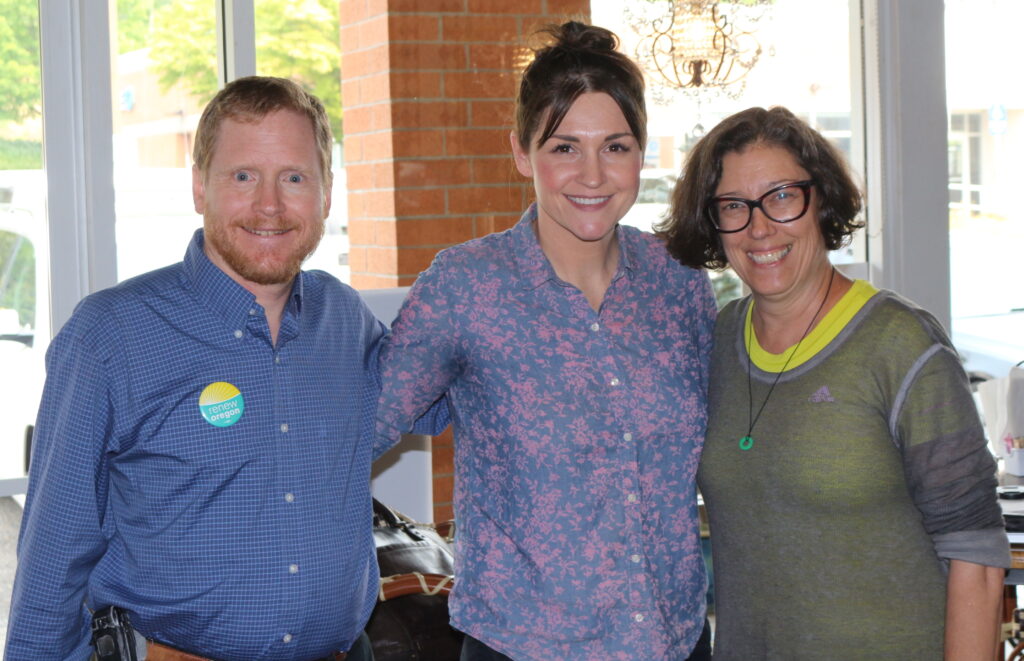
That summer, I also started writing letters to my Oregon Representative Diego Hernandez. I met him for the first time on September 25, 2018, on a legislative working day at the Oregon state Capitol. I always enjoyed my interactions with him. We had a great rapport. He even showed me some tricks on my iPhone for taking selfies before we took a selfie. Diego was always very supportive of my climate lobbying and organizing. We met for coffee in December 2018 and 2019 to discuss his support for the cap and invest legislation for the upcoming legislative sessions.
Periodically, I would send him letters and cards urging him to support the cap and invest bill, which became known as The Clean Energy Jobs Bill or HB 2020 in the 2019 Oregon Legislative session. From my conversations with him, I had no doubt that he would be a final yes on these climate bills. If he perceived there was strong environmental justice measures in these bills, he was a strong advocate to support them. I would still write to him though to keep the bill on his radar, to know that he has constituents behind him to support strong climate legislation, and to serve as an example to others.
On February 6, 2019, Renew Oregon had a lobby day at the Oregon state Capitol to meet with the state legislators to urge them to support The Clean Energy Jobs Bill. When I met with Rep. Hernandez inside his office, he said, ‘Look right behind you, Brian.’
When I looked right behind me on his bulletin board, he had attached with push pins all the letters I sent him over the previous months. There were at least 3 letters from me. Apparently, Diego liked to display letters from constituents, and most of the letters tacked up on the bulletin board were from me. This showed me very clearly that elected leaders do read letters from constituents and hang on to them when considering policy decisions and votes.
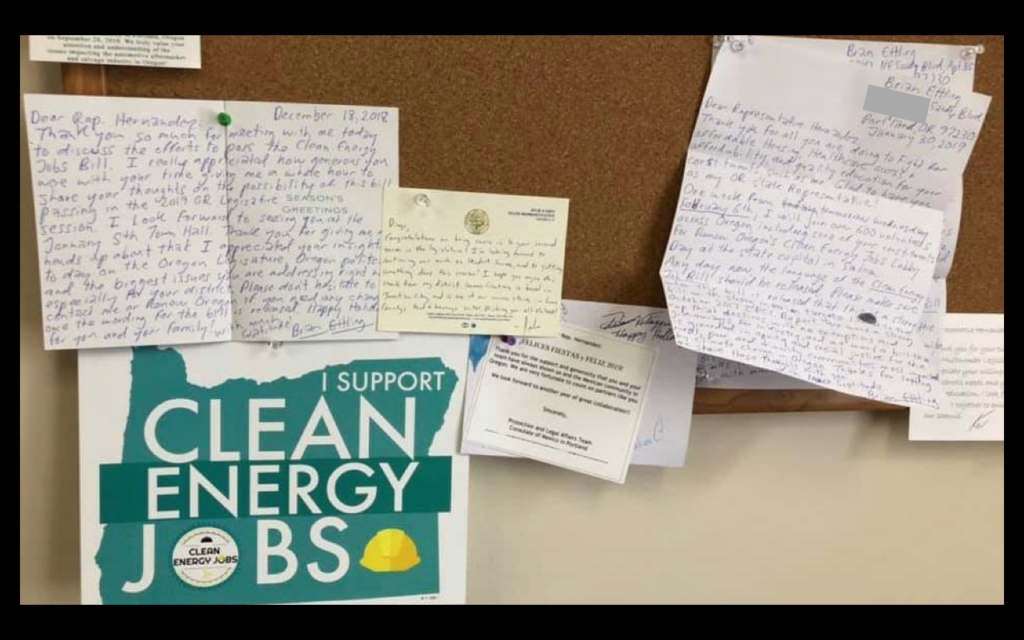
Rep. Hernandez laughed with delight as I was amazed seeing my letters and taking pictures of them hanging from his bulletin board. In my climate PowerPoint presentations later that year, I would stress as an effective climate action of writing to your elected officials. I shared the story of Diego hanging my letters on his bulletin board and show the picture. It would get a big laugh from the audience that most of the letters were from me. I have friends who have seen my climate change talks from 2019 who still talk about those images to this day.
Rep. Hernandez continued to be very supportive of my climate lobbying and strongly supporting the climate bills I advocated. He probably would have supported those bills even without my lobbying. However, I think he liked that he had constituents like me cheering him on and strongly urging him to support climate legislation.
Unfortunately, Rep. Diego Hernandez resigned from office on March 15, 2021 due to sexual harassment charges filed against him from staff and lobbyists at the Capitol. The House Ethics Committee planned to recommend a House floor vote to expel him. It is important to believe the women and I thought he should be fully accountable for his actions. I was very disappointed that he did not act in a professional manner towards women in his position of power. I considered him to be a friend. I texted him on the day he resigned to offer that I am there for him if he ever wanted to talk. It was sad and totally understandable why he had to resign from the legislature.
Relationships with Oregon legislators with SJM 5 Resolution and ongoing to this day…
The good news was that I had also built up very good relations with other state legislators in the Oregon House and Senate. As I blogged about previously, during the summer of 2020, I started meeting by Zoom and phone with Oregon Legislators that I had met during my lobbying for the cap and invest bills in 2019 and 2020. As a Citizens’ Climate Lobby (CCL) volunteer, I urged them to endorse the Energy Innovation and Carbon Dividend Act (EICDA).
As I organized CCL volunteers across Oregon, we successfully urged over 30 Oregon legislators to endorse the EICDA by early 2021. September 17, 2020, I met by phone then Rep. Tiffiny Mitchell to ask her to endorse the EICDA. In addition to her endorsement, Tiffiny asked if she could introduce a statewide resolution supporting the bill. Because of a great rapport I had built up with Senator Michael Dembrow and his friendship with Tiffiny Mitchell, he proudly introduced the resolution on the Oregon Senate floor February 4, 2021, when it officially became known as Senate Joint Memorial 5 or SJM 5.
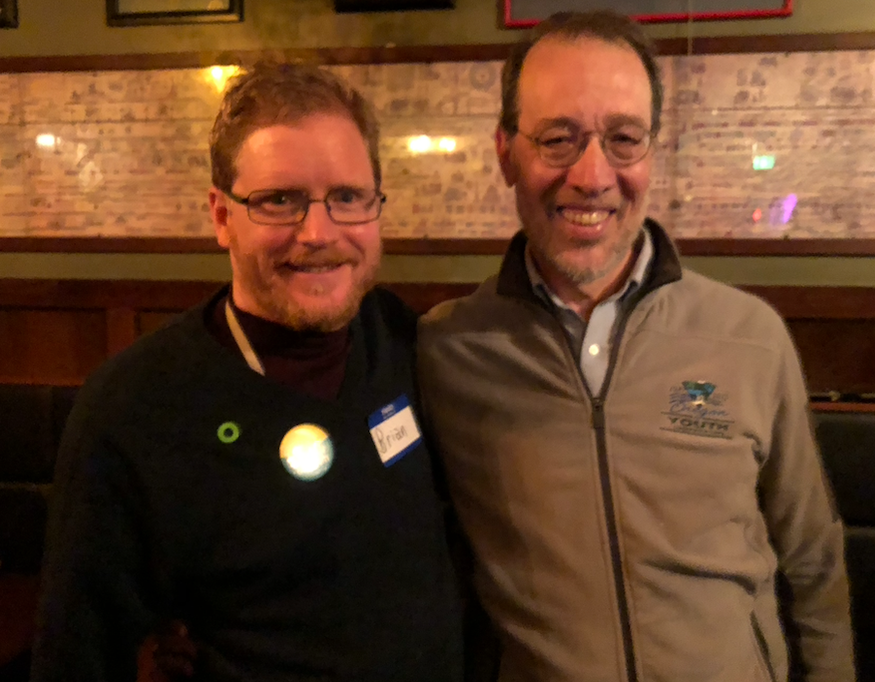
SJM 5 passed the Oregon Senate on April 7th by a vote of 23 to 5, with 6 Republican Senators, half of the Oregon Republican Senate caucus, joined with all the Democratic Senators present to vote to support SJM 5. Unfortunately, SJM 5 fell short of receiving a floor vote in the Oregon House in June 2021. The exciting part was that 30 House members, including 7 Republicans, signed on to co-sponsor SJM 5. The Oregon House has 60 members. Thus, half the chamber were co-sponsors of SJM 5.
Even though House Democratic leadership did not allow for a vote on SJM 5 because they thought it was “too bipartisan,” all the House co-sponsors who supported SJM 5 showed we could have easily passed this resolution through the Oregon House.
Many these co-sponsors that signed on because of Zoom lobby meetings and phone calls I had with them. Many of these state legislators still knew my name from the 2019-20 lobbying I did for the cap and invest bills. Getting to know many of these legislators and the positive efforts that many legislators took to help with this effort was a fantastic experience, even if SJM 5 failed to get a floor vote in the Oregon House.
In the middle of this lobbying effort, my new Oregon Representative and Senator turned out to be very supportive. In January 2021, Shemia Fagan resigned as my Oregon Senator to become Secretary of State. Community organizer Kayse Jama was appointed as the Senator replace Shemia soon afterwards. Before his appointment as Oregon Senate, he called me in January 2021 to get to know me. After Kayse Jama was appointed, I met with him, and he seemed positive about supporting SJM 5.
During the April 7th Oregon Senate floor vote on SJM 5, I still had his personal cell number from his January phone call. I texted him to thank him for his vote. He texted back with a very lovely response, “NO! Thank you for all your advocacy! It was my pleasure to vote for this.”
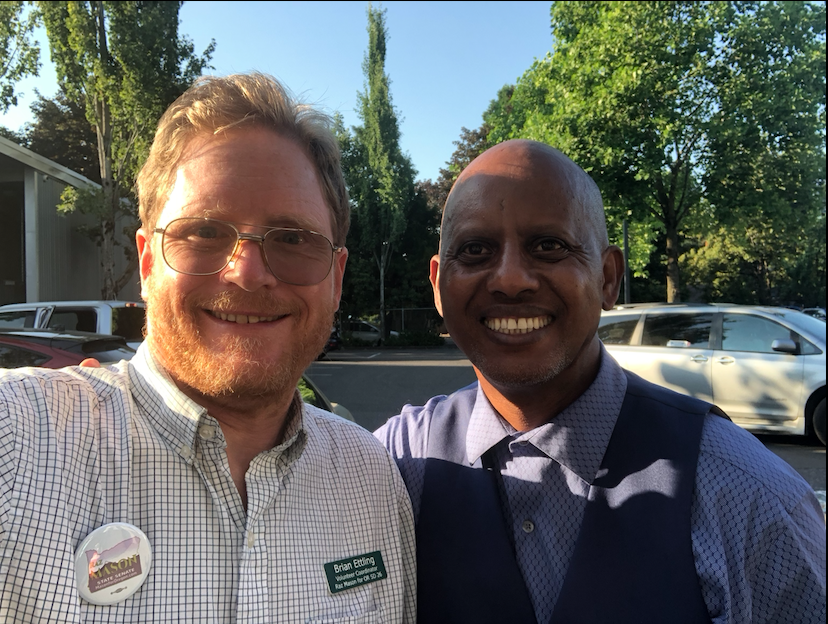
When I saw Senator Jama at an Oregon Democratic Party fundraiser in December 2022, I mentioned to him that I hoped to meet in January to discuss top priority climate change bills. He responded that he always enjoys meeting with me to hear about about climate bills that are important to me. He seems to take my views into consideration. He would probably vote for these bills anyway but seems happy that he has constituents like me advocating for these bills.
In January 2021, a friend talked me into briefly becoming a Multnomah County Democratic Party Precinct Committee Person (PCP). When Diego Hernandez resigned in February 2021, the Multnomah County Democratic PCPs were scheduled to take a vote for a recommendation to the Multnomah County Commissioners to appoint a replacement. In early March, only one candidate called me, Andrea Valderrama, to ask for my vote.
It was a great phone call. She immediately impressed me that she would be an excellent Oregon Representative for my district. Even more, she took an interest in me as a community member and person to learn about my interests. I mentioned to her about the SJM 5 resolution. She immediately took an interest in supporting it and co-sponsoring it. In her earliest days as an Oregon Representative, she was very helpful in co-sponsoring SJM 5.
More recently, Oregon Legislators representing the nearby Gresham area, have asked me which climate legislation I would be supporting for the 2023 Oregon Legislative session. They know me by name. They have told me that they like to converse with me about climate legislation when they see me at community events, their town halls, and lobby meetings.
Thus, Greg Hamra’s advice, ‘Do you know the names of your members of Congress and state legislators? Wait! Better yet: Do they know your name?’ is still bouncing around in my head 6 years later and having a huge impact on me.
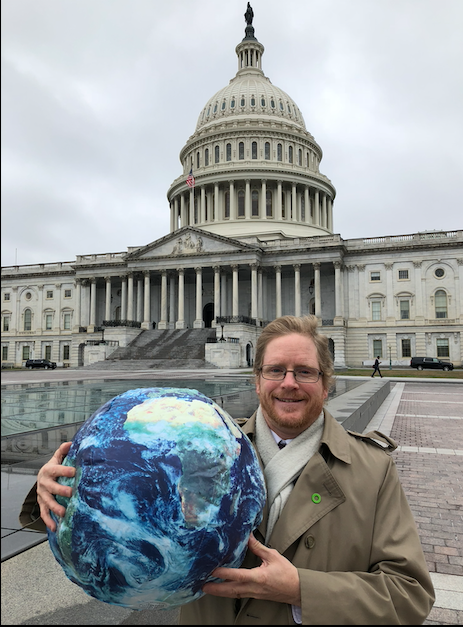

Brian you are an inspiration. You are as tireless and committed as anyone I’ve met in this urgent movement to save our planet. Thank you for this piece, and for all that you do to keep us moving forward!
Thank you so much for saying that, Nancy Shimeall! I sure do appreciate that. It is such a blessing to know you through Climate Reality. I am very grateful that you read my blog.